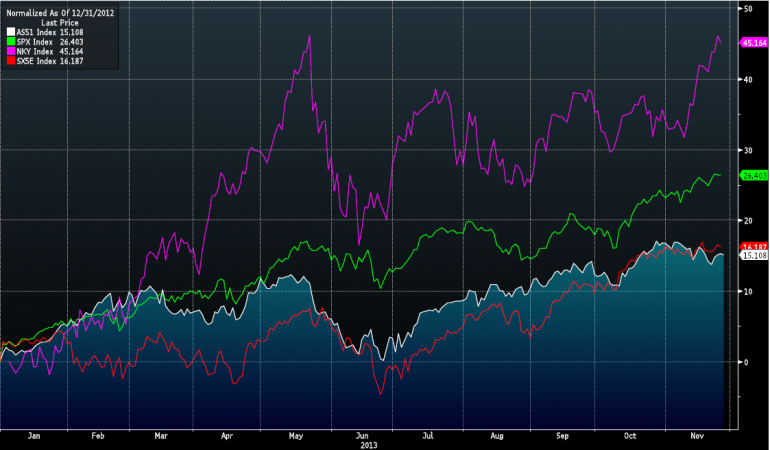Are bubble worries overblown?
October was the first month in more than two years that more Australian listed companies upgraded their earnings per share forecasts than reduced them. Overall, it is good news for the market.
As we close in on the year end, there has been some concern from investors the market is in bubble territory. Given the terrifying end to 2008 and sideways markets from 2009 to 2011, it is easy to appreciate investors’ fear for thinking there is bad news just around the corner.
Developed markets have surged, with US and German indexes reaching all-time highs. The ASX 200 has rallied 15 per cent (white line) this year alone. The S&P 500 has added 26 per cent (green line), the Nikkei 45 per cent (pink line) and Euro Stoxx (red line) 16 per cent.

Source: Bloomberg
The current strength in Australia’s equity market has largely been driven by a price-earnings expansion – the market has pushed higher on the expectation of future earnings. Earnings season in February will need to deliver an increase in earnings accordingly to justify current prices.
While it would be realistic to assume future returns are going to be less than what we have experienced so far this, to conclude the market is in bubble territory might be premature.
As it stands, equity markets in the developed world are trading at price-earnings ratios higher than 10-year averages. The only other market more expensive on the price-earnings ratio than the Australian market is the US market, and only marginally.
On a relative historic basis it could be concluded that developed markets are expensive. But as monetary policy has destroyed the traditional characteristics of every asset class, historical averages offer little anchorage for reference today.
Investors have been forced to seek out equities as an asset class to supplement income requirements, which has undoubtedly skewed valuation metrics. As a result, excessive liquidity has kept interest rates low and is supporting equity valuations through sustained investor interest.
This is not to say some stocks or even asset classes for that matter are not overvalued, though it is unlikely equity markets are in bubble territory.
The concern for investors domestically and globally should be the stunted revenue growth as companies have cut spending to grow business in a bid to please risk-averse investors.
If equity markets are expensive, it certainly brings into question just how expensive are other asset classes?
















